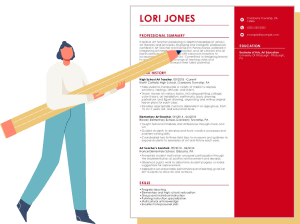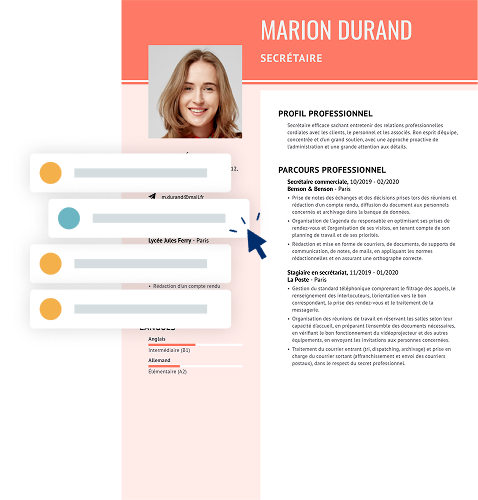How to Write a Personal Statement for a CV
Your personal statement is the first thing recruiters read on your CV, so making it strong is essential. Understanding the ideal length, the right words to use, and expert tips will help you create a compelling statement that effectively highlights your skills and experience.


Our customers have been hired by: *Foot Note
Your personal statement (or professional summary) is the first thing recruiters see on your CV, located just below your contact details. In a few lines, it provides a snapshot of who you are, what you bring to the table, and what you’re looking for in your next role. This section sets the tone for your CV, highlighting your key skills and achievements in a way that grabs attention and encourages recruiters to read on.
In this guide, we’ll show you how to write an effective statement, from structuring the right message to avoiding common mistakes.
How to write a personal statement for a job in 5 steps

Learning how to structure a personal statement is a valuable skill that will benefit you throughout your career – and not just when updating or creating your CV. Writing a professional summary teaches you to summarise your background and career goals into a few concise sentences, making it an excellent exercise for job interviews, networking, and professional speaking opportunities.
Here’s how you can create a strong personal statement for a job in just five simple steps:
STEP 1
Identify and list your strengths
Start by identifying your key strengths. Think of any personal qualities, acquired skills, or professional accomplishments that employers may find useful when scanning through your CV. For example, if you’re an electrician, this could include your technical expertise in wiring or knowledge of safety regulations.
Here are some questions you may ask yourself to identify and list your career strengths:
- What are the key skills I’ve developed during my career?
- What achievements or accomplishments am I most proud of?
- What do colleagues or managers often compliment me on?
- What tasks in my job do I excel at or enjoy the most?
- How have I added value to my previous teams?
STEP 2
Analyse the job description
Now that you’ve identified your strengths, take a closer look at the job description for the position you wish to secure. Carefully examine the employer’s expectations. Pay particular attention to the keywords and phrases they use to describe the responsibilities, qualifications, and skills they’re looking for.
Incorporating these keywords in your personal statement and throughout your CV will help ensure that your application meets the employer’s needs. If the company uses an applicant tracking system (ATS), using these keywords will increase the likelihood that your application will be flagged for review by a recruiter.
This small but effective step can significantly improve your chances of getting through the ATS and being noticed by more employers. To give you an example, here’s a short list of keywords a nurse might want to include in their CV personal statement:
- Patient care
- Clinical expertise
- Effective collaborator
- Medical procedures
- Compassionate communicator
STEP 3
Start with a strong opening statement
Start your CV summary with a strong, powerful opening sentence that grabs the reader’s attention. The first sentence of your personal statement should concisely highlight your key strengths and provide a clear snapshot of your professional identity. To maintain a polished and professional tone, consider omitting personal pronouns.
For example, instead of starting with a generic phrase such as “I am a hardworking and dedicated professional”, opt for something more specific and results-oriented, such as “Experienced marketing manager with a proven track record of increasing brand awareness by 30%, specialising in creating innovative campaigns that drive growth”. This approach immediately communicates your value and sets a confident tone for the rest of your statement.
A great way to get inspiration for your personal statement’s opening line is to see how others present their strengths and achievements. Check out our personal statement examples to help you write a compelling and impactful summary.
STEP 4
Quantify your contributions
The aim of writing a personal statement is to demonstrate the impact you’ve had in your previous roles, and there’s no better way to do this than by quantifying your contributions. Whenever possible, include specific figures, percentages, or milestones to show the tangible results of your work, for example:
Led a team of 15 to increase sales by 35% in six months, exceeding revenue targets.
This will help employers quickly understand the value you can bring to their organisation.
STEP 5
Proofread and edit
Take the time to proofread and edit your personal statement carefully. Check for spelling, grammar, and punctuation errors. Read your statement several times, focusing on clarity, tone, and overall flow.
You may also want to read it aloud to ensure it sounds natural and coherent. If possible, ask someone else, a friend or colleague, to review it and provide feedback. A fresh perspective can help catch any overlooked mistakes and ensure that your personal statement is as polished as possible.
Writing a strong personal statement is just one way to make your CV stand out – choosing the right format can be just as important for making a strong first impression. Check out our CV format guide for tips on choosing the best layout for your job application.
How to write a CV personal statement for different industries
The way you structure your CV personal statement may vary depending on the industry, or the role you wish to secure. Below, we explore how to write a personal statement for different fields and share personal statement samples you can use as inspiration:
How to write a personal statement for healthcare jobs
To secure a job in healthcare, it’s important to demonstrate both your technical expertise and your ability to provide compassionate care to patients. Here are three tips to make your healthcare personal statement stand out:
- Emphasise your patient care skills: Highlight your ability to communicate effectively with patients, demonstrate empathy, and provide compassionate care, as these are critical in healthcare roles.
- Highlight your technical knowledge: Mention your understanding of medical protocols, healthcare regulations, and any specialised skills relevant to the role.
- Demonstrate your problem-solving skills: Focus on your ability to handle challenging situations, make quick decisions and deliver solutions in fast-paced or high-pressure environments.
Compassionate and detail-oriented Registered Nurse with over four years of experience in providing high-quality patient care. Skilled in assessing patient conditions, administering treatment, and working with multidisciplinary teams to improve patient outcomes. Known for strong communication skills and a commitment to maintaining a safe and supportive environment for patients and their families.
How to write a personal statement for marketing jobs
For a role in marketing, mentioning skills in developing strategies and executing campaigns may help you stand out. Here are tips you can use to write a compelling CV summary as a marketing professional:
- Showcase your creative skills: Highlight your experience in creating innovative marketing strategies, campaigns, and content that resonate with target audiences.
- Demonstrate analytical skills: Focus on your ability to analyse data, track metrics, and adjust strategies to improve campaign performance.
- Highlight your results: Provide specific examples of how your efforts have led to measurable success, such as increased sales, customer engagement, or brand awareness.
Results-driven Marketing Manager with a track record of developing and implementing successful marketing strategies that increase brand awareness and sales. Has expertise in digital marketing, campaign management, and data analysis with a focus on driving engagement and conversion rates. Proven leadership skills and ability to work with cross-functional teams to achieve business objectives.
How to write a personal statement for retail jobs
In retail, your personal statement should show you know how to connect with customers and contribute to the success of the store. Use these tips to write a strong professional summary for a retail CV:
- Emphasise customer service skills: Show your ability to engage with customers, solve problems, and ensure a positive shopping experience.
- Highlight your sales achievements: Showcase your experience in driving sales, upselling, or meeting targets to demonstrate your contributions.
- Showcase your product knowledge: Highlight your understanding of products, trends, or services. Mention how you previously used this knowledge to assist customers and drive sales.
Friendly and reliable Cashier with over two years of experience providing excellent customer service in a fast-paced retail environment. Skilled in handling transactions, managing cash and ensuring customers have a positive shopping experience. Skilled in problem-solving and assisting customers with product enquiries.
How to write a personal statement for engineering jobs
When writing a personal statement for engineering jobs, focus on the following strengths:
- Highlight your technical skills: Focus on specific technologies, tools, or software you’ve worked with and how you apply them to engineering projects.
- Showcase your problem-solving experience: Provide examples of complex problems you’ve solved and how you’ve used your engineering expertise to deliver effective solutions.
- Demonstrate attention to detail: Highlight your ability to manage projects while ensuring quality and efficiency in all aspects of your work.
Innovative and solutions-oriented Civil Engineer with extensive experience in the design, planning, and management of major infrastructure projects. Skilled in structural analysis and ensuring compliance with safety and regulatory standards. Proven track record of delivering projects on time, within budget, and to the highest quality.
DOs and DON’Ts for writing a good CV personal statement
Make sure your personal statement is tailored to the specific role you’re applying for. Emphasise the skills and experience that are most relevant to the role. You can also adjust your tone to reflect the company culture and job requirements.
It’s easier to write your personal statement once you’ve completed the rest of your CV. By then you’ll have a clearer idea of how you want to position yourself and what strengths you want to highlight.
Keep it concise and to the point. Aim for no more than three to four sentences that clearly convey your skills, experience, and value. Recruiters and hiring managers often skim CVs, so it’s important to keep your personal statement brief and to the point.
Avoid repeating information already included in the rest of your CV, such as job descriptions or qualifications. Remember that your personal statement should summarise your key strengths, not repeat what’s already been said.
Your personal statement should briefly highlight your key skills, relevant experience, and career goals.
Keep it short, ideally between 100-150 words, to make a strong impression without overwhelming recruiters.
Tailor your statement for each application by focusing on the requirements of the role and using job-specific keywords.
Avoid repeating job descriptions or qualifications that are already listed elsewhere on your CV.
If you have little or no work experience, focus on your education, internships, transferable skills and enthusiasm for the industry.
FAQs about CV personal statement writing
How long should a personal statement be on a CV?
A personal statement on a CV should be about three to four sentences, about 50-150 words. In a standard document, this is about three to five lines. The aim is to make it concise yet persuasive, highlighting your key skills, experience, and career goals without going into unnecessary detail.
Too short and it may lack impact; too long and recruiters may skip it. Keep it focused, tailored to the role, and engaging enough to make them want to read more.
What should I include in my personal statement?
Include a brief overview of your skills, experience, and career goals. Highlight what makes you a strong candidate for the role and how your background matches the company’s needs.
Should I use personal pronouns in my personal statement?
It’s okay to use personal pronouns such as “I” or “me” in your personal statement, just make sure you use the same tense throughout. Focus on your skills and achievements while maintaining a clear and professional tone.
Can I change my personal statement for different job applications?
Yes, you should tailor your personal statement for each application. Adapt the content to the specific requirements of the role and emphasise the skills that are most relevant to the position.
What’s the difference between a personal statement and a cover letter?
A personal statement is a concise summary at the top of your CV that highlights your key skills, experience, and career goals in just a few sentences. It’s designed to quickly grab the attention of recruiters and give them a snapshot of your professional profile.
A cover letter, on the other hand, is a separate document that provides a more detailed explanation of why you’re a good fit for the role. It allows you to expand on your achievements, explain career gaps, or demonstrate your enthusiasm for the role. While a personal statement is short and to the point, a cover letter should include specific (preferably real-life) examples of how your skills and experience match the job requirements.
Do I need a personal statement if I have little or no work experience?
Yes! If you have little or no work experience, your personal statement is a great place to highlight your education, transferable skills, volunteering or internships. To learn how to write a personal summary with little work experience, focus on qualities such as adaptability, problem-solving and enthusiasm for learning to show employers why you’re a strong candidate.

Olga Knapinska
Content writer
*The names and logos of the companies referred to above are all trademarks of their respective holders. Unless specifically stated otherwise, such references are not intended to imply any affiliation or association with myperfectCV.










